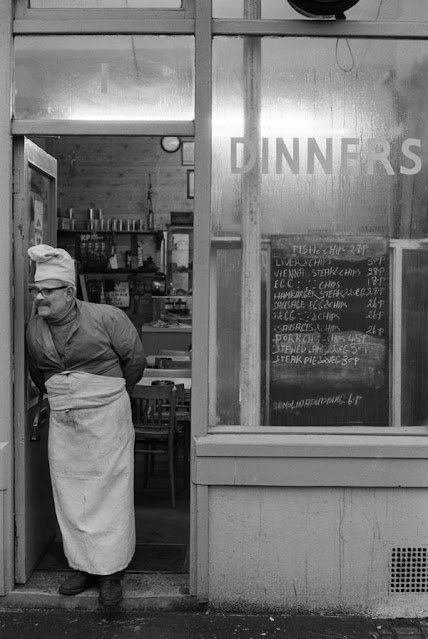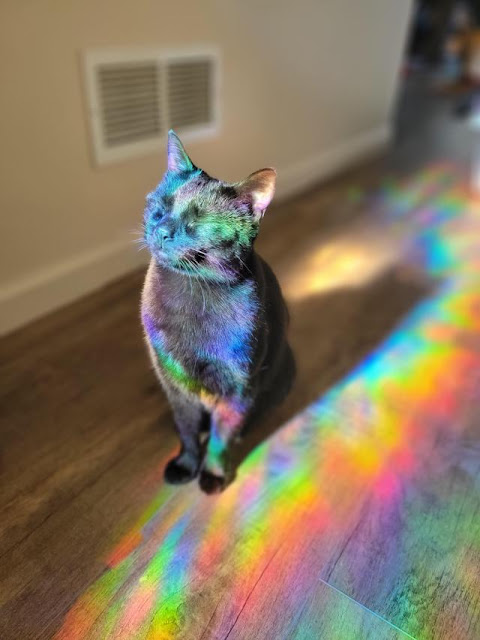Supersede ultimately comes from the Latin verb supersedēre, meaning "to sit on top of" (sedēre means "to sit"), "to be superior to," or "to refrain from," but it came to English through Scots Middle English, where it was rendered superceden and used synonymously with defer.
Good words to have
Amiable (AY-mee-uh-buhl) Pleasant; friendly. From Latin amicus (friend), which also gave us amity, amicus curiae, amigo, inimical, and enemy.
The well taught philosophic mind
The
well taught philosophic mind
To
all compassion gives;
Casts round the world an equal eye,
/
And feels for all that lives.
-Anna Laetitia
Barbauld, poet, essayist, and editor (June 20, 1743-1825)
I Love B&W
50,000 books
19 bookshelves with
50,000 books fell over in domino style after the first bookshelf gave way. The
library was closed for one day so the mess could be cleaned up. Lorain Public
Library in Lorain, Ohio, USA. 1971.
Learn with libations on this pub crawl of NYC’s literary history
Written by Rossilynne Skena Culgan
As Edgar Allan Poe once wrote,
"What care I how time advances? I am drinking ale today." His words
serve as the toast to kick off the weekly Literary Pub Crawl, which highlights
the fascinating literary history around New York City, particularly in
Greenwich Village.
Though the Literary Pub Crawl has a
long history in New York City—25 years, 200 authors and 2,000 beers—it remains
one of the more under-the-radar walking tours around town. As a book nerd who
loves a good pint or two, I recently took the tour and was so delighted by it
that I won't gatekeep this super fun Saturday activity.
On the tour, guides will lead you to
four bars throughout the Village. I won't spoil the surprise and spill the
names of all four, but I will say that you'll start at The Four-Faced Liar.
Inside that pub, you'll meet your fellow tour members (my group contained three
librarians!) and learn that there was so much American literature written in
Greenwich Village.
Authors like Ernest Hemingway, J.D.
Salinger, Edith Wharton, Louisa May Alcott, Jack Kerouac, Frank McCourt,
Langford Wilson, F. Scott Fitzgerald, James Baldwin, and Edgar Allan Poe all
have connections to the neighborhood. As our guide Kurt Kingsley put it, The
Village was at one time a "dumping ground of social misfits"—and,
yes, that makes for really good writing.
The guides—who are actually
actors—share excerpts from the author’s works during the tour. They breathe
life into words by poets like Dylan Thomas and Amiri Baraka to powerful effect,
so powerful that I added several works to my to-be-read list.
Along the route, guides will point out
other historical sites, like the prison where Mae West served time after being
arrested for her show "Sex;" the apartment where Alex Haley wrote The
Autobiography of Malcolm X; and the teeny-tiny building where Pulitzer
Prize-winning poet Edna St. Vincent lived.
You'll learn about the notorious
speakeasy, Chumley's, where F. Scott Fitzgerald and Zelda Fitzgerald got
married and where Orson Welles was said to have left an outstanding tab
totaling 30,000 beers. A few streets away, there's the tale of a fight between
Bob Dylan and Andy Warhol over Edie Sedgwick's affections.
It feels very special to sip a beer at
a spot where Frank McCourt tried to rub shoulders with the "real"
writers and where Jessica Lange tended bar.
At each bar, you'll get a chance to
buy a drink and listen as the guides share fascinating tales of the authors who
hung out, drank, and wrote there. It feels very special to sip a beer at a spot
where Frank McCourt tried to rub shoulders with the "real" writers
and where Jessica Lange tended bar.
It's all quite dramatic. But is it
true?
"We will never let the truth get
in the way of a good story," our guide Camber Carpenter joked, though the
team does extensive research to make sure the stories are as true as possible.
They've even debunked neighborhood legends. As Eric Chase, owner of Literary
Pub Crawls and Walking Tours puts it: "Often the truth is more
interesting."
He founded the company in the late
1990s when Greenwich Village still maintained an identity as a counter-culture,
accessible and affordable neighborhood. Back then, dozens of literary bars
remained true to their cultural roots.
He was part of a group trying to
fundraise for a small theater company called The New Ensemble (now defunct).
They'd host events at bars like Chumley’s, the White Horse Tavern and Cornelia
Street Cafe, where they'd share history about writers and perform their work.
Eventually, that turned that into a literary pub crawl, drawing inspiration
from the famed Dublin Literary Pub Crawl.
Even after the theater company closed,
Chase gave the pub crawl its own life, expanding the tours to other
neighborhoods. There’s a Brooklyn Literary Tour and a Bohemian Village Tour as
well, in addition to the classic Literary Walking Tour in Greenwich Village.
We’ve dedicated ourselves to help keep
the history and memory of the people and literature that made Greenwich Village
a truly iconic neighborhood.
"What makes us unique is our
passion, performance, our ongoing research and our tenacity. We have watched
gentrification rapidly change the vibe and the affordability of Greenwich
Village and we’ve dedicated ourselves to help keep the history and memory of
the people and literature that made Greenwich Village a truly iconic
neighborhood," Chase said. "Of the five bars part of the original
1998 tour, only one still exists, and is not really accessible to tours in the
same way anymore. Yet we persevere and continue to find new and interesting
stories and pubs that keep the spirit of the village alive."
Over the decades, they've stayed true
to their mission: Get lit with us.
The tour runs about three hours,
totaling a mile of walking. Tickets cost $49/person, plus bring along some cash
if you'd like to buy drinks. When I attended, the group was a mix of longtime
locals and visitors of all ages. From the young librarians visiting from Canada
to the longtime Manhattanite in her senior citizen years, everyone left having
learned something, having sipped a few drinks, and hopefully feeling inspired
to go read.
The appearance of things changes
The appearance of things changes according to the emotions, and thus we see magic and beauty in them, while the magic and beauty are really in ourselves. Khalil Gibran
Kurt Vonnegut told his wife he was going out to
Kurt Vonnegut told his wife he was
going out to buy an envelope. She replied “Oh, she says, well, you're not a
poor man. You know, why don't you go online and buy a hundred envelopes and put
them in the closet?
And so I pretend not to hear her. And
go out to get an envelope because I'm going to have a hell of a good time in
the process of buying one envelope.
I meet a lot of people. And see some
great looking babies. And a fire engine goes by. And I give them the thumbs up.
And I'll ask a woman what kind of dog that is. And, and I don't know. The moral
of the story is - we're here on Earth to goof around.
And, of course, the computers will do
us out of that. And what the computer people don't realize, or they don't care,
is we're dancing animals. You know, we love to move around. And it's like we're
not supposed to dance at all anymore."
apocryphal (uh-PAH-kruh-ful)
apocryphal (uh-PAH-kruh-ful)
Of doubtful authenticity; the term is often applied to stories
or legends that are often repeated but likely not true.
Apocryphal can also describe something resembling or relating
to the Apocrypha, the ancient Jewish books that are not part of the Hebrew
Bible but are considered canonical in Roman Catholic and Eastern Orthodox
churches. In the biblical use, the word is often capitalized.
Both apocrypha and
apocryphal come, via Latin, from the Greek word apokrýptein, meaning "to
hide (from), keep hidden (from)," which in turn comes from krýptein,
"to conceal, hide."
Memento Mori
“Memento Mori” is
Latin expression meaning “Remember that you will die”
This phrase,
originated in ancient Rome and was used by soldiers, philosophers, and the
religious. The expression meant different thing to each group, for some it meant
a call to conscience, a reminder of the fragility of life and the importance of
embracing the present. For others it
meant reflection, exploring the mysteries of death and the purpose of life and spiritual
preparation.
Another
expression is Amor Fati or love of fate. It means to love everything that
happens to you as a way of learning and as a way of toughening yourself. There
is pain in Life …but….that’s life. That's part of what life is about is about. Part
of Amor Fati means that if complain about what you must deal with in life, pain
as an example, and you wish things were different, if you wish for a life
without pain, it means that you don't love life because you don’t accept it.
Accept everything that happens and find a way to love it and see the purpose
behind it.

.jpg)

.jpg)


.jpg)



.jpg)

.jpg)



.jpg)








.jpg)




.jpg)
.jpg)
